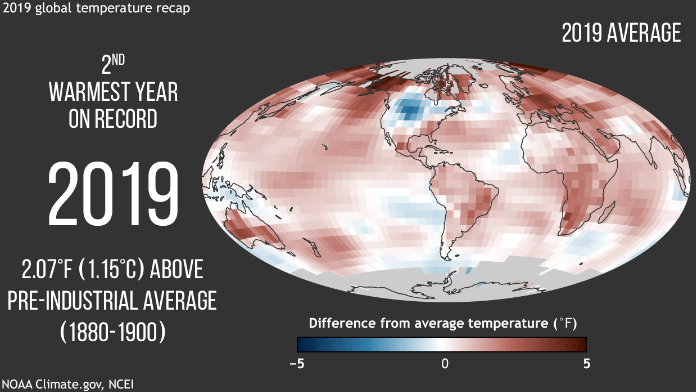Government scientists concluded that the globally averaged temperature for 2019 was 1.71 degrees Fahrenheit above the 20th-century average and 2.07 degrees above the 19th-century average. This is the 43rd consecutive year that the global temperature was above the 20th-century average.

This was the second-highest since record keeping began in 1880 and was just 0.07 degrees less than the record value set in 2016. Nine of the 10 warmest years have occurred since 2005, and the five warmest years have occurred since 2015.
Overall, North America’s temperature was 1.62 degrees above the 1910–2000 average, marking the 14th-warmest year. Record high annual temperatures were measured across parts of central Europe, Asia, Australia, New Zealand and southern Africa.
The average annual temperature for the contiguous U.S., which doesn’t include Alaska or Hawaii, was 52.7, or 0.7 degrees above the 20th-century average. This ranked in the warmest third of the record and was the coldest year since 2014. Wisconsin’s annual average temperature ranked 46th in the record.
The contiguous U.S. average annual precipitation was 34.78 inches, 4.84 inches above the long-term average. The year 2019 was the second-wettest year on record. Wisconsin, along with North Dakota, South Dakota, Minnesota and Michigan, had its wettest year on record in 2019.
Also, 2019 saw the continued trend in the decline of Arctic sea ice extent. The average annual sea ice extent in the Arctic was approximately 3.94 million square miles, the second-smallest in the 1979-2019 record. This continues a trend of sea ice loss of about 18,000 square miles per year. That is more than a quarter of the size of Wisconsin.
Over the 41-year satellite record of sea ice coverage in December, the Arctic has lost about 734,000 square miles of ice — 11 times the size of Wisconsin. The extent of sea ice around the Antarctic was also the second-smallest annually averaged value on record.
Steve Ackerman and Jonathan Martin, professors in the UW-Madison Department of Atmospheric and Oceanic Sciences, are guests on WHA radio (970 AM) at 11:45 a.m. the last Monday of each month.

